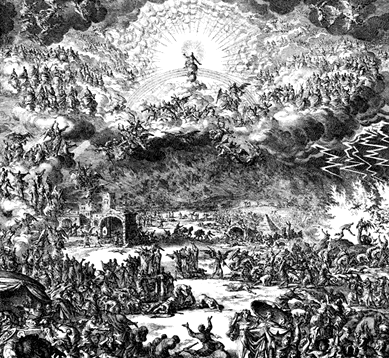February 7, 2012.
“What on earth are you doing?” A more important question would be, “What are you doing on earth?” Don’t laugh now, but Jesus is coming back. I know: you’re not laughing. But the world is. The apostle Peter warned us to expect it: “There shall come in the last days scoffers, walking after their own lusts, and saying, Where is the promise of his coming?” (2 Peter 3:3-4). Scoffing is worse than laughing. It is ridiculing, scorning, mocking.
A principal argument the scoffers use is: “Since the fathers fell asleep, all things continue as they were from the beginning of the creation” (vs. 4). They say the laws of the universe are fixed; everything in the universe can be explained by the laws we see operating today. In geology, this is called uniformitarianism: the earth’s strata are explained via natural laws still operating today.
Uniformitarianism is opposed to catastrophism, which says some things in the earth’s crust are explained by past catastrophes. What Peter is telling us is that in the last days scoffers will ignore the evidence for catastrophes, specifically the global flood in the time of Noah. “For this they willingly are ignorant of, that by the word of God… the world that then was, being overflowed with water, perished” (vss. 5-6).
Some people misread the rainbow promise in Gen. 9:11, thinking that God promised to never destroy the world again. It says: “Neither shall there any more be a flood to destroy the earth.” Never again — by a flood. But 2 Peter, after speaking of the flood, makes it clear: “The heavens and the earth, which are now, by the same word are kept in store, reserved unto fire” (3:7). Notice “by the same word.” The same God who once destroyed the world with water is going to destroy it next time with fire.
But when? “Where is the promise of his coming?” It’s been nearly 2,000 years since Jesus made that promise. Where is He? Here is my paraphrase of verses 8-9: “Don’t you know that God is not bound by time? Nor is he negligent with his promises. Actually, he is very patient, giving people the opportunity to turn their lives around to avoid the coming judgment.” On a side note, verse 8 contains one of the most abused phrases in the Bible: “One day is with the Lord as a thousand years.” Why do people attempt to construct mathematical theories out of this? There is no math here. The verse continues: “and a thousand years as one day.” It is not math. Taken literally, the two statements cancel out one another. The full verse is simply a graphic way to say that God is not governed by time; He is eternal, timeless.
But watch out! Yes, it’s been thousands of years since the flood; it’s been thousands of years since Jesus promised to return. “But the day of the Lord will come as a thief in the night” (vs. 10). Does that mean it will all be in secret as the saints vanish and the world continues on? Hardly. Rather, as a thief, He will come when He is not expected. What happens then? Verse 10 continues: “in the which the heavens shall pass away with a great noise, and the elements shall melt with fervent heat, the earth also and the works that are therein shall be burned up.” When Jesus returns, life on this planet ends.
Forget about a possible World War III. Focus, rather, on the really important future event — when God intervenes. Therefore, warns the apostle: “Seeing then that all these things shall be dissolved, what manner of persons ought you to be in all holy conversation and godliness” (vs. 11). It will be an awful day and a great day. It will be “the day of judgment and perdition of ungodly men” (vs. 7). But if we are in Christ, “we, according to his promise, look for new heavens and a new earth, wherein dwells righteousness” (vs. 13).
None of this is new to you if you know the Word. Rather, as Peter said: “This second epistle, beloved, I now write unto you; in both which I stir up your pure minds by way of remembrance” (vs. 1). As we get bogged down in earthly concerns, we need reminders of what we are doing on earth, of where we are headed. The following thought, which I read somewhere, is not meant to be technically correct; rather it’s to stir us to reflection: As a Christian, this life is the only hell you are ever going to see; if you are not a Christian, this is the only heaven you are ever going to see!
